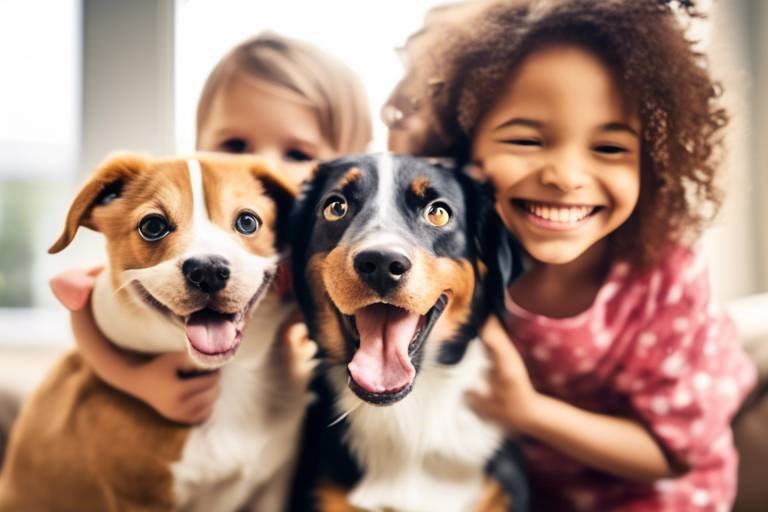The Emotional Benefits of Pet Adoption
Adopting a pet is not just about bringing a furry friend into your home; it's about opening your heart to a world of emotional benefits that can transform your life. Imagine coming home after a long day, feeling the weight of the world on your shoulders, and then being greeted by a wagging tail or a soft purr. The emotional connection you develop with your pet can provide a sense of companionship that alleviates feelings of loneliness and isolation. Whether it’s a playful puppy or a cuddly kitten, pets have an incredible ability to enhance our lives in ways we often take for granted.
When you adopt a pet, you're not just saving a life; you're also enriching your own. The bond that forms between you and your pet can lead to deeper connections with others as well. You might find yourself chatting with fellow dog owners at the park or bonding with friends over shared stories of your beloved cat's antics. This social engagement can significantly improve your emotional well-being, making your life feel more vibrant and connected.
Moreover, the act of adopting a pet is an act of love—an opportunity to make a difference in the life of a homeless animal. Knowing that you’ve given a second chance to a creature in need can fill your heart with joy and purpose. It’s like planting a seed of compassion that grows into a beautiful garden of emotional rewards. The simple act of caring for another being can bring immense satisfaction and a sense of fulfillment that’s hard to replicate.
In summary, the emotional benefits of pet adoption are profound and multifaceted. From companionship and social connections to the joy of giving a homeless animal a loving home, adopting a pet can lead to a richer, more meaningful life. So why not take that leap of faith? Your future furry friend is waiting for you, ready to shower you with love and loyalty!
- What are the emotional benefits of adopting a pet? Adopting a pet can provide companionship, reduce feelings of loneliness, and enhance social interactions. Pets also offer unconditional love and can significantly improve mental health.
- How do pets help reduce stress? The presence of pets has been shown to lower blood pressure and promote relaxation, making them effective stress-relievers.
- Can pets be used in therapy? Yes, pets are often incorporated into therapy settings to provide comfort and support, aiding in emotional healing for individuals facing mental health challenges.
- What impact do pets have on depression? Studies indicate that pet ownership can alleviate symptoms of depression, providing motivation and a sense of purpose for individuals struggling with mental health issues.
- How does pet ownership foster responsibility? Caring for a pet instills a sense of responsibility and helps establish a daily routine, contributing to a more structured and fulfilling life.

Companionship and Connection
This article explores the various emotional advantages of adopting pets, including companionship, stress relief, and the joy of giving a homeless animal a second chance at life.
When you adopt a pet, you're not just bringing home a furry friend; you're inviting a companion into your life that can fill your days with joy and warmth. This bond goes beyond mere ownership; it’s a connection that can alleviate feelings of loneliness and enhance your social interactions. Imagine coming home after a long day, and there, wagging its tail or purring softly, is your loyal pet, ready to greet you with unconditional love. This simple act of companionship can turn an ordinary day into something special.
Pets have an incredible ability to make us feel less alone. Whether it's a dog that follows you around the house or a cat that curls up in your lap, these little creatures offer a comforting presence that can significantly enrich your life. They become part of your daily routine, and their need for care and affection fosters a sense of purpose. When you see that excited face waiting for you at the door, it’s hard not to feel a surge of happiness. This bond can lead to a deeper emotional connection, as both the pet and the owner learn to rely on each other for companionship.
Moreover, pets can enhance our social lives in unexpected ways. Have you ever noticed how easy it is to strike up a conversation with a fellow dog owner at the park? The shared experience of caring for pets can break down barriers and create opportunities for friendships. You might find yourself participating in pet-related events or joining local groups focused on animal welfare, which can expand your social circle and introduce you to like-minded individuals. In this way, your pet not only becomes a companion but also a bridge to new relationships.
It’s also important to recognize that the emotional connection we form with our pets can lead to a more fulfilling life. Studies have shown that pet owners often report higher levels of happiness and life satisfaction. The joy of having a pet can translate into better mental health, as the companionship they provide helps to combat feelings of isolation. In fact, many pet owners describe their pets as family members, highlighting the profound emotional ties that develop over time.
To summarize the impact of companionship and connection through pet adoption, consider the following key points:
- Emotional Bonding: Pets create a deep emotional bond that alleviates loneliness.
- Social Opportunities: Pets facilitate social interactions and community connections.
- Increased Happiness: Pet ownership is linked to higher levels of happiness and life satisfaction.
In essence, adopting a pet is not just about providing a home for an animal in need; it’s about enriching your own life. The companionship and connection fostered through pet adoption can lead to a more fulfilling, happier existence. So, if you're considering adding a furry friend to your life, remember that you’re not just saving an animal; you’re also gaining a lifelong companion who will bring endless joy and connection into your world.
Pets are known to reduce stress and anxiety levels. Their presence can promote relaxation, lower blood pressure, and improve overall mental well-being.
The therapeutic benefits of pets can significantly improve mental health by providing unconditional love and support, making them valuable companions for those facing emotional challenges.
Incorporating pets into therapy sessions can enhance emotional healing, offering comfort and a sense of security to individuals undergoing treatment for various mental health issues.
Studies show that pet ownership can alleviate symptoms of depression, providing motivation and a sense of purpose for individuals struggling with their mental health.
Caring for a pet instills a sense of responsibility and helps establish a daily routine, contributing to a more structured and fulfilling life for pet owners.
Pets offer unconditional love and loyalty, which can boost self-esteem and provide emotional support, helping owners feel valued and appreciated.
Having a pet can facilitate social interactions, as pet owners often connect with others through shared experiences, fostering friendships and community ties.
The joy of pet adoption creates cherished memories that enhance emotional well-being, as owners share unique experiences and adventures with their furry companions.
- What are the emotional benefits of adopting a pet? Adopting a pet can provide companionship, reduce stress, and improve overall mental health.
- How do pets help with loneliness? Pets offer constant companionship, making individuals feel less isolated and more connected.
- Can pets improve social interactions? Yes, pets can serve as a social catalyst, helping owners meet new people and form friendships.
- What should I consider before adopting a pet? Consider your lifestyle, the time you can dedicate to a pet, and the type of pet that suits your living situation.

Stress Relief and Mental Health
When it comes to managing stress and enhancing mental health, pets can be a game-changer. Imagine coming home after a long, exhausting day, and there’s your furry friend, tail wagging and eyes sparkling with joy. That simple act of greeting can instantly lift your spirits! Pets have this amazing ability to be present and offer a kind of emotional support that is hard to find elsewhere. They don’t judge, they don’t hold grudges, and their love is genuine and unwavering. This unconditional affection can significantly reduce feelings of loneliness and anxiety, making them perfect companions for anyone feeling overwhelmed by life’s challenges.
Research has shown that interacting with pets can lead to a decrease in stress hormones like cortisol while simultaneously boosting the production of serotonin and dopamine—two neurotransmitters associated with feelings of happiness and well-being. Just think about it: when you pet a dog or cuddle a cat, your body releases these feel-good chemicals that help you relax. It's like having a built-in therapist that doesn't charge by the hour! The simple act of petting a dog can lower your blood pressure and heart rate, creating a sense of calm that can be incredibly beneficial for your mental health.
Furthermore, pets can help combat feelings of depression. For many people, the responsibility of caring for an animal can provide a sense of purpose and routine. When you have to feed, walk, and play with a pet, it encourages you to get out of bed and engage with the world. This daily structure can be crucial for someone struggling with depression, as it can create a sense of normalcy and stability. In fact, studies have shown that pet owners often report feeling more fulfilled and less isolated than those without pets.
The therapeutic benefits of having a pet extend beyond just emotional support. Many therapists now incorporate animals into their sessions, recognizing the profound impact pets can have on healing. For instance, therapy dogs are often used in hospitals and rehabilitation centers to help patients cope with pain and anxiety. The soothing presence of a pet can create a safe space for individuals to express their feelings and work through difficult emotions. It’s a beautiful synergy—humans and animals working together to foster healing and growth.
In therapy settings, pets provide comfort and a sense of security, allowing individuals to open up in ways they might not be able to otherwise. The gentle nudge of a dog’s head or the soft purring of a cat can help ease tension, making it easier for someone to share their thoughts and feelings. Many therapists have noted that the presence of a pet can lead to more productive sessions, as clients feel more relaxed and willing to engage. It’s as if the pet acts as a bridge, connecting the therapist and client through shared moments of joy and comfort.
Moreover, studies have consistently shown that pet ownership can alleviate symptoms of depression. A furry companion can provide motivation to get up and move, whether it’s for a walk or a game of fetch. This physical activity is not only beneficial for the pet but also for the owner’s mental health. The routine of caring for a pet can instill a sense of purpose, helping individuals find joy in the little things again. It’s like having a reason to smile every day, knowing that your pet relies on you for love and care.
Ultimately, caring for a pet is about more than just companionship; it’s about building responsibility and establishing a routine that can lead to a more structured and fulfilling life. The act of feeding, grooming, and exercising a pet can create a sense of normalcy that many people crave, especially during tough times. Just like a garden that needs regular watering and care, your mental health flourishes when you establish a routine that includes the love and care of a pet.
- How do pets help with stress relief? Pets provide companionship, promote physical activity, and release feel-good hormones that help reduce stress levels.
- Can pets really improve mental health? Yes, pets can alleviate symptoms of anxiety and depression, provide emotional support, and create a sense of purpose.
- What types of pets are best for emotional support? Dogs and cats are commonly chosen for emotional support due to their affectionate nature, but other animals like rabbits and birds can also provide companionship.
- How can I incorporate my pet into my self-care routine? Include regular playtime, walks, and cuddle sessions as part of your daily self-care routine to enhance both your and your pet’s well-being.
Therapeutic Effects of Pets
When we talk about the , we're diving into a world where furry companions become more than just animals; they transform into lifesavers. Imagine coming home after a long, exhausting day, and there’s your dog wagging its tail, or your cat purring softly on your lap. This simple act of companionship can significantly uplift your spirits and provide a sense of comfort that is hard to replicate. Pets have an innate ability to sense our emotions, often providing support just when we need it the most.
Research has shown that pets can help reduce feelings of loneliness and isolation. Just having a pet around can lead to a decrease in anxiety levels. For those facing emotional challenges, the presence of a pet can be a source of unconditional love and non-judgmental support. Pets don’t care about your bad day or your worries; they’re just happy to be with you. This kind of emotional stability is crucial for individuals battling mental health issues.
Moreover, the act of caring for a pet can promote a sense of purpose. When you have a furry friend relying on you for food, exercise, and affection, it can motivate you to get out of bed and face the day. It’s like having a built-in accountability partner who encourages you to maintain a routine. This routine can be incredibly beneficial for people struggling with depression, as it helps to create a structure that can lead to a more fulfilling life.
In therapy settings, pets are increasingly being incorporated into treatment plans. For example, therapy animals are often used in sessions to help individuals feel more at ease. The presence of a pet can create a safe space where clients feel comfortable expressing their feelings. This is particularly beneficial for children and those who struggle with verbal communication. The bond formed with a therapy animal can facilitate breakthroughs that may not occur in traditional talk therapy.
To illustrate the impact pets can have on mental health, consider the following table that highlights some of the key benefits:
| Benefit | Description |
|---|---|
| Reduced Anxiety | Petting an animal can lower cortisol levels, which reduces stress. |
| Increased Happiness | Interactions with pets can increase serotonin and dopamine levels, improving mood. |
| Improved Social Skills | Pets can serve as social catalysts, helping owners connect with others. |
| Emotional Support | Pets provide a sense of companionship and unconditional love. |
In summary, the extend far beyond mere companionship. They provide emotional support, reduce feelings of isolation, and can even play a crucial role in mental health therapy. The bond between humans and their pets is a unique relationship that fosters healing and growth. So, if you’re considering adopting a pet, remember that you’re not just giving a homeless animal a second chance; you’re also opening the door to a world of emotional benefits that can enhance your life in countless ways.
- Can pets really help reduce stress?
Yes, studies have shown that interacting with pets can lower stress levels and promote relaxation. - What types of pets are best for therapeutic effects?
Dogs and cats are commonly known for their therapeutic effects, but other animals like rabbits and guinea pigs can also provide emotional support. - How do I know if I'm ready to adopt a pet?
Consider your lifestyle, living situation, and ability to commit time and resources to care for a pet before making a decision.
Pets in Therapy Settings
Incorporating pets into therapy settings has become a transformative practice that enhances emotional healing for many individuals. Imagine walking into a room where a soft, furry companion greets you with wagging tails and warm purrs. This welcoming presence can create an immediate sense of comfort and safety, which is crucial for anyone undergoing emotional or psychological challenges. The bond formed between humans and animals can act as a bridge, helping individuals express feelings that they might otherwise find difficult to articulate.
Research shows that therapy animals can significantly reduce feelings of anxiety and depression. They offer a non-judgmental ear and a comforting presence that encourages patients to open up. The act of petting a dog or cat can lower blood pressure and promote the release of oxytocin, often referred to as the "love hormone," which enhances feelings of trust and connection. This is particularly beneficial in therapy settings, where building rapport is essential for effective treatment.
Moreover, therapy pets can help individuals with various mental health issues, including:
- Post-Traumatic Stress Disorder (PTSD): Animals can provide grounding and emotional support, helping individuals cope with trauma.
- Autism Spectrum Disorders: Pets can facilitate social interactions, making it easier for individuals to connect with others.
- Depression and Anxiety: The companionship of a pet can alleviate feelings of loneliness and despair.
In therapy settings, the presence of animals not only aids in emotional healing but also fosters a sense of community and belonging among participants. Group therapy sessions that include pets can create a more relaxed atmosphere, allowing individuals to bond over shared experiences. This unique dynamic can result in stronger therapeutic alliances and improved outcomes for participants.
In conclusion, the integration of pets into therapy is not just a trend but a profound approach that recognizes the emotional and psychological benefits of these furry friends. As we continue to explore the depths of human-animal connections, it becomes increasingly clear that pets are not just companions; they are invaluable allies in the journey toward healing and well-being.
- What types of animals are used in therapy? Common therapy animals include dogs and cats, but some settings also use rabbits, birds, and even horses.
- How do therapy animals help with mental health? They provide comfort, reduce anxiety, and promote social interactions, making them effective in various therapeutic settings.
- Can any pet be a therapy animal? Not all pets are suited for therapy work. They must have the right temperament, be well-trained, and undergo specific evaluations.
Impact on Depression
The impact of pet ownership on depression is profound and multifaceted. Numerous studies have shown that having a furry companion can significantly alleviate the symptoms of depression. When you adopt a pet, you’re not just bringing home a new friend; you’re inviting a source of unconditional love and companionship into your life. This bond can be incredibly uplifting, especially during those days when everything feels a bit too heavy. Imagine coming home to a wagging tail or a gentle purr; it’s like a warm hug that reminds you that you are never truly alone.
Pets provide a sense of purpose, which is crucial for anyone battling depression. The daily responsibilities of pet care, such as feeding, walking, and grooming, can help create a routine that is beneficial for mental health. This structure can be a lifeline for someone who feels lost or overwhelmed. It’s as if your pet is a little anchor, keeping you grounded during turbulent times. Additionally, the simple act of caring for another living being can foster feelings of accomplishment and self-worth, which are often diminished in those struggling with depression.
Furthermore, the presence of a pet can stimulate the release of oxytocin, the hormone associated with bonding and affection. This biochemical reaction can lead to a significant reduction in feelings of sadness and loneliness. In fact, studies have shown that pet owners often report feeling happier and more fulfilled than those without pets. The joy of simply playing with your dog or cuddling with your cat can provide a much-needed distraction from negative thoughts and feelings.
To illustrate the positive effects of pet ownership on depression, consider the following statistics:
| Study | Findings |
|---|---|
| American Psychological Association | Pet ownership linked to reduced symptoms of depression and anxiety. |
| Human-Animal Bond Research Institute | 75% of pet owners reported improved mental health after adopting a pet. |
| University of Missouri | Pet owners exhibited higher levels of happiness and lower levels of depression. |
The companionship of a pet can also foster social connections, which is vital for those who may isolate themselves due to their mental health struggles. Walking a dog often leads to conversations with other pet owners or neighbors, creating opportunities for social interaction that can combat feelings of loneliness. These interactions can be just as important as the bond with the pet itself, providing a network of support and understanding.
In conclusion, the impact of pet ownership on depression cannot be overstated. From providing a sense of purpose and routine to enhancing social interactions and boosting overall happiness, pets have a unique ability to improve mental health. So, if you’re considering adopting a pet, remember that you’re not just giving a homeless animal a second chance—you’re also giving yourself a chance at a brighter, more fulfilling life.
Building Responsibility and Routine
When you adopt a pet, you're not just bringing home a furry friend; you're also stepping into a world filled with new responsibilities that can enrich your life in profound ways. Just imagine waking up each morning to the soft, eager eyes of your pet, reminding you that they depend on you for everything from food to love. This daily routine becomes a beautiful dance of mutual care and affection, creating a rhythm that can enhance your overall well-being.
One of the most significant emotional benefits of pet adoption is the sense of responsibility it cultivates. Caring for a pet requires commitment and consistency, which can lead to a more structured life. For instance, feeding, walking, and grooming your pet can set a schedule that anchors your day. This routine not only helps the pet thrive but also provides you with a sense of purpose and accomplishment.
Moreover, the act of caring for a pet can be incredibly rewarding. It teaches valuable life skills such as empathy, patience, and time management. You might find yourself planning your day around your pet's needs, which can lead to healthier habits for yourself. For example, regular walks with your dog not only benefit their physical health but also encourage you to get outside and be active, which has a positive impact on your emotional state. The bond formed through these daily activities can be incredibly fulfilling.
Furthermore, having a pet can help you establish a routine that brings stability to your life, especially in times of chaos. When everything else feels uncertain, knowing that you have a little creature relying on you can be a grounding force. The responsibilities of pet ownership can also serve as a distraction from daily stressors. Instead of ruminating on your worries, you find yourself focused on the needs of your pet, which can be a refreshing change of pace.
To illustrate the various ways pet ownership can build responsibility and routine, consider the following table:
| Responsibility | Routine Activity | Emotional Benefit |
|---|---|---|
| Feeding | Set meal times | Creates structure and predictability |
| Walking | Daily walks | Encourages physical activity and social interaction |
| Grooming | Regular grooming sessions | Enhances bonding and promotes relaxation |
| Training | Daily training exercises | Builds trust and enhances communication |
In conclusion, adopting a pet is more than just a heartwarming decision; it’s a commitment that molds your daily life and emotional landscape. The responsibilities that come with pet ownership not only foster a sense of duty but also create a nurturing routine that can lead to a more fulfilling and structured existence. So, if you’re considering adoption, remember that you’re not just saving a life; you’re also enriching your own.
- How does pet ownership affect mental health? Pet ownership can significantly reduce feelings of loneliness and depression, providing companionship and a sense of purpose.
- What are the responsibilities involved in pet ownership? Responsibilities include feeding, exercising, grooming, and providing medical care for your pet.
- Can pets help with stress relief? Yes, pets can lower stress levels and promote relaxation through their companionship and the routines they create.
- How can I establish a routine with my pet? Set specific times for feeding, walks, and playtime to create a consistent daily schedule that benefits both you and your pet.

Unconditional Love and Loyalty
When you think about the unconditional love that pets offer, it’s like having a warm blanket wrapped around your heart. They don’t care about your bad hair days, your mood swings, or how many times you’ve forgotten to feed yourself. Instead, they greet you with wagging tails and purring cuddles, reminding you that you are cherished, just as you are. This kind of loyalty is rare in human relationships, making the bond between pets and their owners incredibly special.
Imagine coming home after a long, exhausting day. You open the door, and there they are, your furry companion, waiting for you with excitement that seems to light up the entire room. This simple act of joyful greeting can significantly lift your spirits, reinforcing the idea that you are loved and missed. Pets have a magical way of making you feel like the most important person in the world, even if you’ve had the worst day imaginable.
Moreover, the loyalty of pets is profound. Dogs, for instance, are often referred to as "man's best friend" for a reason. They are incredibly intuitive and can sense when you’re feeling down. They’ll snuggle closer, nuzzle your hand, or even bring you their favorite toy, as if to say, “I’m here for you.” This emotional support can be invaluable, especially during tough times when you might feel isolated or overwhelmed. In fact, studies have shown that pet owners often report feeling less lonely and more connected to the world around them.
The love of a pet can also boost your self-esteem. Knowing that you are responsible for another being's happiness can instill a sense of purpose. When you see your pet thrive—whether it’s through their playful antics or their healthy glow—you can’t help but feel a sense of achievement. This nurturing role can enhance your self-worth, reminding you that you are capable of providing love and care.
In addition to emotional benefits, pets can also help foster connections with other people. When you walk your dog in the park, you're likely to strike up conversations with fellow pet owners. It’s like an instant icebreaker! Sharing pet stories, tips on training, or even just enjoying a moment of laughter over your pets’ silly behavior can create lasting friendships and a sense of community. This social interaction can further enhance your emotional well-being, making you feel more connected and less isolated.
In summary, the that pets provide are not just heartwarming; they are essential to our emotional health. They teach us about love, responsibility, and connection in ways that are both profound and transformative. The joy of knowing that you have a loyal companion by your side can truly change your life for the better. So, if you’re considering adopting a pet, remember that you’re not just giving them a home; they will also give you a heart full of love in return.
- What are the emotional benefits of pet adoption? Adopting a pet can provide companionship, reduce stress, and enhance overall mental well-being.
- How do pets help with loneliness? Pets offer unconditional love and companionship, making their owners feel valued and less isolated.
- Can pets improve my mental health? Yes, pets can promote relaxation, lower blood pressure, and alleviate symptoms of anxiety and depression.
- What should I consider before adopting a pet? Consider your lifestyle, the time you can dedicate to a pet, and the type of pet that would best fit your home and family.
Enhancing Social Interactions
Having a pet isn't just about the joy of their presence; it also opens up a world of social opportunities that can significantly enhance your interactions with others. Picture this: you’re out for a walk with your dog, and suddenly, you find yourself chatting with a fellow dog owner. This simple encounter can lead to new friendships, shared stories, and even a sense of community. Pets act as a natural icebreaker, making it easier to connect with people you might not have approached otherwise. They create a common ground, allowing conversations to flow effortlessly.
The magic of pet ownership lies in its ability to foster connections. For instance, pet owners often attend events like dog parks, pet expos, or even training classes. These gatherings are not just about the pets; they’re about the people too. You’ll find yourself surrounded by individuals who share similar interests and values, which is a fantastic way to build relationships. Whether you're discussing training tips, sharing funny stories about your pets, or simply enjoying each other's company, these interactions can lead to lasting friendships.
Moreover, pets can enhance family bonds as well. When families adopt a pet together, they embark on a shared journey filled with responsibilities and joys. This shared experience can strengthen relationships among family members, as they work together to care for their furry friend. From taking turns feeding the pet to planning family outings that include the pet, these activities create a sense of unity and purpose.
In addition to enhancing personal relationships, pets can also help break down social barriers. For those who may struggle with social anxiety or shyness, having a pet can provide a sense of comfort and confidence. Imagine walking into a room filled with strangers, but your trusty companion is by your side. This can make it much easier to engage in conversations and meet new people, as the presence of a pet often invites friendly interactions.
Furthermore, pets can enrich our lives by connecting us with a broader community. Many pet owners become involved in local animal welfare organizations or community events, such as charity walks or adoption drives. These activities not only benefit the animals in need but also provide an opportunity to meet like-minded individuals who are passionate about similar causes. Engaging in such community-oriented events can significantly enhance your social network while contributing to a greater good.
In summary, the presence of a pet can dramatically enhance social interactions by acting as a bridge between individuals, fostering connections, and creating shared experiences. So, if you’re looking to expand your social circle, consider the powerful role that a furry friend can play in your life. After all, every wagging tail or gentle purr has the potential to lead to a new friendship!
- How can pets help with social anxiety? Pets can provide comfort and act as a social lubricant, making it easier to engage with others.
- What types of social events can pet owners participate in? Pet owners can join dog parks, training classes, pet expos, and community charity events.
- Can pets help strengthen family bonds? Yes, caring for a pet together can create shared experiences that enhance family relationships.
- How do pets facilitate conversations between strangers? Pets serve as a common interest that encourages interaction and conversation among people.
Creating Lasting Memories
When you adopt a pet, you’re not just bringing home a furry friend; you’re opening the door to a world filled with unforgettable moments. Imagine the joy of watching your puppy take its first wobbly steps or the heartwarming sight of your cat curling up next to you on a chilly evening. These little instances are more than just daily occurrences; they are the building blocks of a rich tapestry of memories that will stay with you for a lifetime.
Every day with a pet is an opportunity to create lasting memories. Whether it’s the thrill of a game of fetch at the park, the laughter that erupts when your dog does something silly, or the quiet moments spent together on the couch, each experience adds a new layer to your shared history. These memories not only bring joy but also strengthen the bond between you and your pet.
Additionally, pets often become part of family traditions. From celebrating birthdays with special treats to including them in family photos during holidays, these rituals create a sense of belonging and unity. They become a part of your family story, and their presence enriches every occasion. Here are some ways in which pet adoption leads to the creation of amazing memories:
- Adventures Together: Whether it’s hiking in the mountains or strolling through the neighborhood, every adventure with your pet is a chance to explore and discover together.
- Milestones: Celebrate those significant milestones, like your pet’s first birthday or the day they came home. These celebrations can be filled with treats, toys, and love!
- Learning Experiences: Training your pet can lead to funny mishaps and learning moments that you’ll reminisce about for years to come.
Moreover, pets have a magical way of turning ordinary days into extraordinary ones. A simple trip to the vet can become a hilarious memory when your pet decides to put on a show, or a rainy day spent indoors can transform into a cozy bonding session filled with cuddles. These moments, while they may seem trivial at the time, accumulate into a beautiful collection of memories that define your life together.
In essence, adopting a pet is not just about saving a life; it’s about enriching your own. The memories you create together become a source of joy, comfort, and nostalgia that you can look back on fondly. So, as you embark on this journey of pet ownership, remember to cherish each moment, for they will become the stories you share with friends, family, and even future generations.
Q: What are some fun activities I can do with my adopted pet?
A: There are countless activities you can enjoy with your pet! Consider going for walks or hikes, visiting dog parks, playing fetch, or even engaging in pet-friendly events in your community. The key is to find activities that both you and your pet enjoy!
Q: How can I ensure that I create lasting memories with my pet?
A: Be present and engaged during your time together. Take photos, celebrate milestones, and try new activities. The more experiences you share, the richer your memories will be!
Q: Can pets help me cope with stress and anxiety?
A: Absolutely! Pets can provide comfort and companionship, which can significantly reduce stress levels. Their unconditional love and playful nature can help lift your spirits and provide emotional support.
Frequently Asked Questions
- What are the emotional benefits of adopting a pet?
Adopting a pet can provide immense emotional benefits, including companionship that helps alleviate loneliness, stress relief through their calming presence, and the joy of giving a homeless animal a second chance at life. These connections can enrich both the pet's and the owner's lives.
- How do pets help reduce stress and anxiety?
Pets have a unique ability to lower stress and anxiety levels. Their unconditional love and playful nature can promote relaxation, lower blood pressure, and improve overall mental well-being. Simply petting a dog or cat can release feel-good hormones that help us unwind.
- Can pets really improve mental health?
Absolutely! Pets provide unconditional love and support, which can be incredibly therapeutic for those dealing with emotional challenges. Their presence can boost mood, provide motivation, and even help alleviate symptoms of depression.
- How do pets contribute to building responsibility?
Caring for a pet instills a sense of responsibility and helps create a daily routine. Feeding, walking, and grooming a pet can give owners a structured schedule, which can lead to a more organized and fulfilling life.
- What role do pets play in enhancing social interactions?
Having a pet can be a great icebreaker! Pet owners often connect through shared experiences and interests, leading to friendships and a sense of community. Whether at the park or a pet event, pets can bring people together.
- How can pets create lasting memories?
The joy of pet adoption leads to cherished memories as owners share unique experiences and adventures with their furry companions. From playful antics to quiet moments, these memories enhance emotional well-being and create a bond that lasts a lifetime.



















